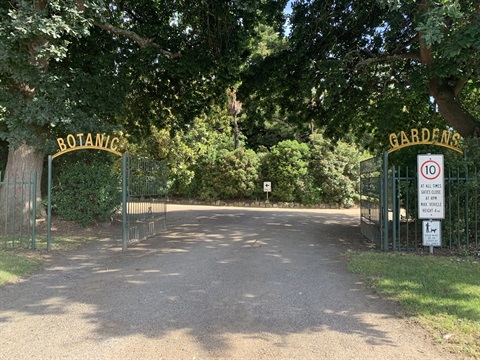
After more than a year of research and planning, a management initiative to protect Colac’s Botanic Gardens and encourage Grey-headed Flying Foxes to roost elsewhere has been approved.
“We lodged the application to disperse the bats and discourage them from returning to the botanic gardens in October last year,” Infrastructure & Leisure Services General Manager Tony McGann said.
“The situation has changed dramatically for all of us, but the need to protect our heritage trees and provide an area for people to walk or jog through and enjoy remains so important for our community, while protecting the bats.
“There are a number of significant trees which will be impacted further if thousands of bats return, and our community need to be able to go for a walk in peace or have their children play at the playground or enjoy a barbecue without equipment covered in bat faeces and a terrible stench; it’s a health issue.
“Grey-headed Flying Foxes play a vital role in ecology and are a protected, endangered species, so their welfare will be a priority as we encouraged them to move on or fly past our gardens and find a more suitable treed space to roost for their breeding season.
“We understand there have been colonies in the Otways before and we have vast areas of trees with nearby waterways, away from the gardens and lake pathways.
“DELWP has granted a Permit to Control Wildlife at the Colac Botanic Gardens after extensive review and consideration by a panel of experts of our management plan which will create the most minimal impact on this important native species while allowing us to protect our trees and our valuable community asset.
“The permit is subject to a range of conditions which minimise impact on the flying foxes and community including dispersal activities only occurring between 4pm and 9am and for a maximum of 2.5 hours within any 12-hour period.
“No dispersal activities can occur when bats are heavily pregnant, dependent young are present or after a heat stress event and can only occur between 1 April and 31 August.
“There are currently only about 150 to 200 bats at the gardens, so now is a suitable time to minimise any impact on the colony, which swells to 7000 over summer.
“The permit allows Colac Otway Shire to disperse any bats and deter bats from roosting over a three-year period, with an annual review, which aims to change the bats habits and encourage them to find a new long-term place to roost.
“There had never been bats at the gardens until about four years ago and we hope that by implementing the management plan now, our heritage-listed trees will have a chance to recover and our community can enjoy our gardens again over spring and summer.
“Colac Otway Shire’s application was reviewed by an independent panel of experts, appointed by the State Government.
“Dispersal techniques, and includes a program of smoke, light and noise to make the gardens less appealing to the bats.
“The dispersal permit also allows further dispersal approval if the grey-headed Flying Foxes were to move to another inappropriate site such as the Memorial Square or a school.
“Initial dispersal will take approximately two weeks and Council has carried out a letter drop to nearby residents to advise that they may hear irregular noises, see flashes of light and on occasions see smoke coming from the gardens.
“Dispersal activity will be overseen by an independent expert to monitor the flying foxes and we will have a local vet on standby to assist if they have any health issues,” he said.
“Any bats dispersed from the gardens may still return to private properties to feed on fruit trees and residents are advised to seek further advice on protecting their trees with appropriate netting.”
People and pets should not approach or handle Grey-headed Flying Foxes and more information about the endangered species and our management plan is available on Council’s website at www.colacotway.vic.gov.au







